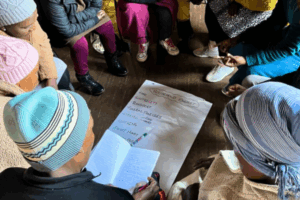Domestic work has long been a focus of academic inquiry, with much research focused on unravelling the complex challenges and vulnerabilities of female domestic workers. However, the nuanced experiences of male domestic workers in South Africa remains a significant gap in this extensive discourse. Resilience and Resistance Among Migrant Male Domestic Workers in South Africa study helps to fill this gap by exploring the experiences and conditions at work of ten male domestic workers from Malawi and Zimbabwe. The study highlights the complex interplay of class, race and gender in domestic work.
Paid domestic work in South Africa is associated with marginalised individuals, perpetuating a historical and social imbalance. It is one of the most precarious and undervalued occupations contributing to the functioning of households. All workers are entitled to basic rights in South Africa, regardless of nationality. However, many international migrant workers are either unaware of their rights, have difficulty accessing them, or are excluded from social protection and pension schemes in some sectors. The vulnerability of migrant workers highlights the need for protection and representation. The Migrant Workers Union of South Africa, for example, works to raise awareness of and defend the rights of migrant workers.
Study highlights
The working life of male domestic workers
Domestic work has long been associated with women, but is a viable employment option for men. Migrant male domestic workers leave their home countries due to unemployment, poverty, low wages and conflict. In many ways, they face similar challenges to their female counterparts, including long hours and low pay, a paternalistic employer-employee dynamic, and precariousness. The study participants worked in other sectors before engaging in paid domestic work.
“In Malawi, I worked on a farm. So, when I came to South Africa, I was working on a farm first, in Durban. But it was tough. The money was the problem. It was not enough at the time. I then left and moved to Gauteng, I was working as a house builder. But again, the money was not enough.”
Study participant, 38 years old
Daily tasks for the participants include indoor and outdoor responsibilities ranging from cleaning, laundry, shopping and cooking to maintaining gardens and swimming pools, security and looking after pets.
Some male domestic workers hold traditional beliefs about the gendered division of domestic work:
“Domestic work is not a woman’s job in Malawi. Men clean in Malawi. Some men also clean here in South Africa.”
Study participant, 43 years old
“I used to lie and say my boss is owning a company, so I am just helping him do whatever where he lives. I just didn’t tell them the truth as I was scared. I was scared they will laugh at me. I was feeling ashamed telling people that I am a domestic worker.”
Study participant, 47 years old
“Women must work inside. The men can be outside. Because sometimes you have, maybe you have a big garden, and she cannot push the lawnmower. And they cannot take the ladder and paint the wall. It is hard for women. It is a job for us men.”
Study participant, 46 years old
The study also reveals that male domestic workers negotiate the tension inherent in performing paid domestic tasks traditionally regarded as women’s work.
“There is a maid when it comes to ironing. I clean the dishes. I mop and vacuum the floors. I change the bed. I clean the bathroom. I clean the toilet. I do everything. But the laundry [and] the ironing, the maid is there. When it comes to ironing, that’s the time when I go to the garden.
Study participant, 44 years old
Most of the participants live on the premises of their employers. While other studies suggest that live-in domestic work can lead to employer exploitation, most participants find that this arrangement, including food and accommodation, reduces their expenses and enables them to invest and support their families.
Negotiating conditions at work
The interplay of race, class, and gender dynamics in the interactions between employers and domestic workers frequently results in imbalanced power dynamics and perpetuates economic exploitation within the employment relationship.
The male domestic workers in the study considered their wages to be fair. On average, they earned R5,000 to R8,000 per month, above the minimum wage of R4,067.20 for a domestic worker working eight hours a day, five days a week. All participants also received meals, at least fifteen days paid annual leave and annual salary increases. Although these individuals could negotiate their conditions at work, not all migrant domestic workers may be able to negotiate conditions to the same extent.
Employment contracts for domestic workers typically need to be renewed periodically, which is costly and time-consuming. None of the male domestic workers in the study had formal written employment agreements, putting them in an precarious situation. Also, none belonged to a workers’ organisation.
“… in the absence of collective resistance, participants use resilience strategies to enhance their livelihoods, rather than overtly challenging these practices. For example, their resilience is exemplified by their acceptance of the domestic worker role, where they perceive fair treatment from their employers. Additionally, some participants engage in ad-hoc gardening or household repair tasks for other families during weekends, supplementing their income to a certain extent. This signifies their resilience by maintaining the existing state of affairs in domestic work while actively seeking supplementary employment to improve their living conditions.”
Study participant, 44 years old
The study recommends a proactive approach to protect domestic workers from exploitation and collectively improve their lives.
Know more: Resilience and Resistance Among Migrant Male Domestic Workers in South Africa
Related article:
Injured at work: How this trade unionist overcame adversity







